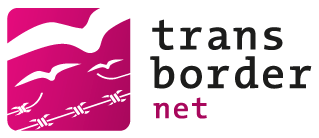For corridors of solidarity
with Alarm Phones against Borders
From Hagen Kopp, Hanau/Germany
More than 500 activists from across Europe, North, West, and Central Africa gathered in July 2019 at the Transborder Summer Camp near Nantes in France. The network Welcome to Europe had initiated the five-day long meeting and invited all working groups and projects along the different routes of flight and migration. The Alarm Phone alone sent delegates from over 20 cities.
The camp started with a “Noborder-Fair”, where the different groups and networks came into exchange on various information tables: Activists from the Balkan route met members of Afrique Europe Interact, Top Manta friends from Barcelona shared their experiences with activists from Izmir or Helsinki, “border crossers” from southern France exchanged experiences with We’ll Come United. Already on this first day a great atmosphere of mutual empowerment developed, which shaped the spirit for the three following days in the workshops, assemblies and in the evenings, accompanied by music, theatre and dance.
Many discussions focused on practical experiences and questions concerning the establishment and expansion of the infrastructure supporting freedom of movement and equal rights for all. It was no coincidence that “Corridors of Solidarity” ranked high in the program. The well-attended workshop on this topic divided into three subgroups: one for the production of multilingual and cross-border information material as well as printed guides and online guides in transit and destination countries; a second on shelters and support spaces such as rest houses, (occupied) social centers or counselling cafes; and a third on various hotline and alarm phone projects along flight and migration routes.
The following is a brief summary of the latter workshop, in which, in addition to the WatchTheMed (WTM) Alarm Phone, four other hotline projects participated: the Alarme Phone Sahara, which is currently under construction, a hotline against push backs in Slovenia, a telephone project on the Alpine border between Italy and France and an emergency telephone against deportations in Frankfurt. Although the contextual frameworks and requirements are very different for all five projects, there were also interesting similarities when discussing the different problems they face.
How do the respective situations change and how can we remain flexible? With whom on the state or institutional side can or must we cooperate? How do we disseminate our telephone number? How do we organize our shifts? How do we deal with language barriers and translations? And last but not least: what can we do against increasing criminalisation?
We all know that state repression follows political and media hypes and, if necessary, they construct completely arbitrary so-called criminal offences. It is theoretically possible for every project that supports refugees or migrants in transit to face accusations of aiding and abetting “illegal entry or residence”. Hence, we are all potential “solidarity criminals”. Accordingly, the question arises everywhere as to how publicly and offensively we present our networks and what should remain invisible particularly for the benefit of those affected.
The WTM Alarm Phone had the most continuous history in the discussion group and is active with many groups and teams in many cities. The transnational and deliberately decentralised structure should make it harder for persecuting authorities to paralyse this hotline project overnight. The WTM Alarm Phone chooses the “Hydra” as an organisational model as a preventive anti-criminalisation strategy: if one head is cut off, two others should grow back. In any case, efforts are being made to create a network structure in which groups can replace each other in their functions, if one or another becomes weakened.
In the middle of the final plenary session in the big tent of the Transborder Summer Camp, a fearless mole emerged from the ground and created a little hill right next to the presenter. Some of the amused participants viewed the animal as a potential secret service infiltrator. But also an alternative analogy was drawn – nicer and somewhat obvious after the many successful discussions of the previous days: the mole as a symbol and inspiration to continue to work on the daily construction and extension of the “Underground Rail Road”* for and with flight and migration movements. The transnational meeting in Nantes was thrilling for so many participants because of the strong mutual inspiration and empowerment experienced, mainly on a practical level. It will definitively live on as a highlight in the history of more than 20 years of Noborder-Camps.
